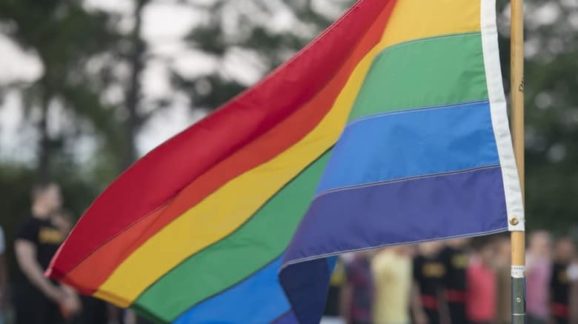Capitalism Trumps Hate
CEOs have often been ahead of cops and politicians on gay rights
Big business wasn’t exactly the first place activists looked for allies as the modern gay rights movement emerged. Large corporations have long been seen as a force for social conformity, antagonistic or at best indifferent toward liberation movements. But legal scholar Carlos A. Ball’s new book, The Queering of Corporate America, makes a strong case that the business world has been one of the more favorable arenas for gay, lesbian, bisexual, and trans people seeking equality. (Ball uses LGBTQ throughout to describe this group.)
This wasn’t always the case, of course. Ball shows how advocates and managers learned to walk the path toward greater equality together, a story that should lead many readers to reassess what they thought they knew about corporate America, civil rights, and social change. Over the course of several decades, activists persuaded companies to adopt nondiscriminatory hiring rules, to protect the jobs of people with HIV, and to extend health care and retirement benefits to same-sex domestic partners. Most of this was achieved at a time when few government agencies had such policies for their own employees and when most politicians—of both major parties—wanted nothing to do with gay rights legislation.
Through a multiyear process that started in 1968, for example, protesters persuaded Pacific Bell to renounce its policy against considering homosexual job applicants. In the mid-1970s, ABC and NBC agreed to make some TV shows less homophobic. In 1985, Bank of America issued a guidance to its managers calling on them to accommodate employees with HIV and to treat AIDS, at that point a subject of great public fear and misunderstanding, as they would any other serious illness. In 1996, Disney began offering domestic partner benefits to same-sex employees. In 2013, Starbucks CEO Howard Schultz publicly rebuked one of his own shareholders who disagreed with the coffee chain’s support for marriage equality, suggesting that the offended investor sell his stock and invest in another company.
Early advances in equal treatment were almost never reversed once integrated into corporate culture. While several early legal advances were rolled back when a more conservative group of voters became dominant, for-profit companies stuck with their policies regardless of who controlled the state house, the White House, or Congress. It turns out that changes negotiated via voluntary arrangements can be less divisive and longer-lasting than those decided at the ballot box.
Since Ball focuses mostly on big companies with big payrolls, his book doesn’t have much to say about the smaller businesses that LGBTQ people have often turned to for community and entertainment rather than for a paycheck and benefits. But it’s worth remembering the ways small businesses also made a place for those outside the mainstream.
Thousands of cafés, bars, and bookshops have served as queer refuges and gathering spots. After the 2016 shooting at the gay nightclub Pulse in Orlando, Florida, Curbed reporter Patrick Sisson wrote that it was “no surprise family and friends of the victims at Pulse compared the attack to the invasion of a church or sacred space, because that’s what these institutions have always represented for the LGBTQ community, both in Southern Florida and around the world.”
Read the full article at Reason.
